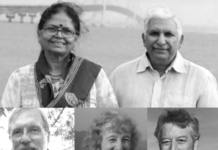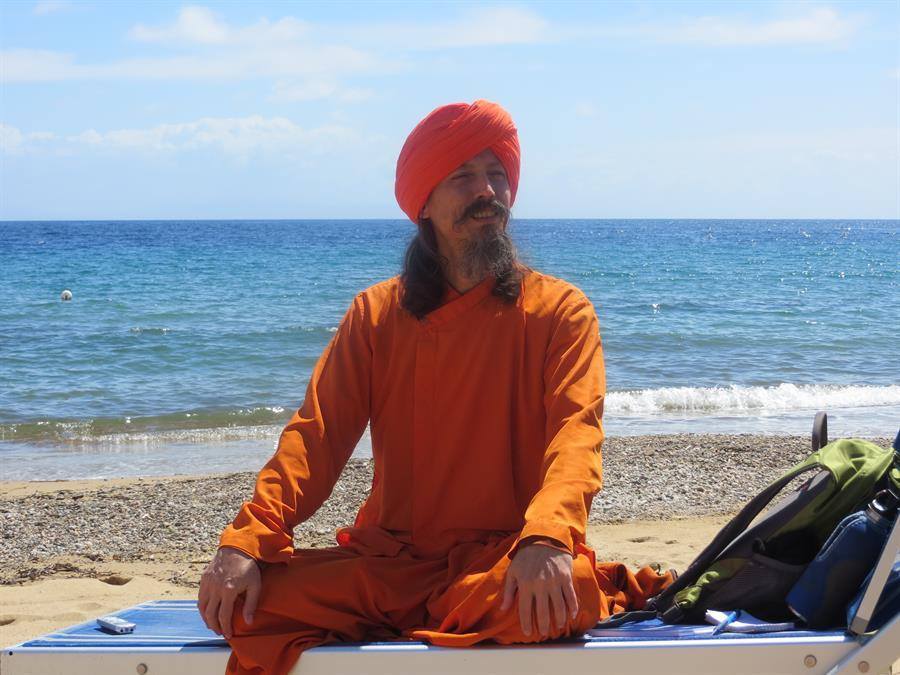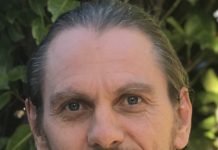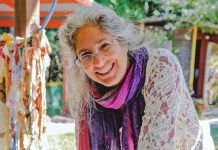I find it intriguing when I meet someone who, from a very early age in life, demonstrates the clarity of his dharma, and who, moreover, persists in pursuing it, even when faced with obstacles and trials throughout the journey. That was my impression of Acarya Rainjitananda Avadhuta during our conversation: that he is a chosen one.
A Brazilian from Rio de Janeiro, he spent his childhood on a farm in Minas Gerais, and at age ten, he went to the capital, Belo Horizonte. In college, he studied engineering and, when he was about to graduate, he began to take an interest in philosophy, with a thirst for finding the answers to the longings that motivate the human being. In the library, he came across a book on the philosophy of yoga, which led him to start taking Hatha Yoga classes. His teacher then presented him with the book Autobiography of a Yogi, which tells the life story of Yogananda, an Indian swami. “The book really inspired me to be a swami,” he says.
Days later, the group of friends who were yoga students was invited to meet a monk. Dressed in orange, Acarya Bhaktapranananda Avadhuta entered the room and taught the kaoshikii dance and afterward invited everyone to a lecture on meditation. The law school room was filled with curious college students enthusiastic about spirituality. “In the end, it was just me and him. I asked him many questions and I thought he would teach me meditation right away. ” But he didn’t. The young engineer was the last in the long list of initiations that Dada Bhaktapranananda would perform the next Sunday.
All water reaches the ocean
“I received my first lesson, I meditated, but nothing happened. I was a little frustrated because I had a lot of expectations. I thought it was just a matter of repeating the mantra and reaching samadhi, like I had read in the book. It was an illusion,” Dada remembers. With a mixture of persistence and attraction, he again questioned his mentor. “Meditation should be done twice a day regularly,” the monk told him. “How often do you practice?” asked the young man. “I do it at least four times a day,” the monk replied. Feeling inspired, Dada Rainjitananda challenged himself, “If he meditates four times a day, I can too!”
From then on, his dedication to the practice and philosophy only made him grow. The benefits began to appear as well as challenges and doubts. What about the family religion? “Once, as I went up the hill to the Rio jagrti, I looked up and saw the Christ Redeemer and at that moment I understood that Jesus was leading me there; it was a sign, and that removed my doubt about being in the right place. When I entered the jagrit, there was a very beautiful picture of Baba. For me, Jesus had led me there and delivered me into good hands.”
The notion of growth and ascension in his trajectory becomes clear in the conversation.
Sharp like a spear, which looks at the target and runs after it, fluid like water, which touches the stone in the river and does not stop, he maintained his flow. To empty into the ocean. “Becoming an acarya was just a matter of time. I was initiated in 1982 and a year and a half later I was in India.” There he found Baba and saw him every day. Then thousands of people arrived for the DMC, where Baba gave a discourse and his mudra as a blessing. From there he went to acarya training in Varanassi, the sacred city of Shiva, where he received his current name: ranjit means “colorful”. Thus he became a monk to whom the path of bliss is full of many colors.
Educated as an engineer and a monk, Dada Rainjitananda served in Brazil, working mostly with PROUT. He helped to found a newspaper, Mover Juntos, on economy and society, distributed in national retreats. He has also served in Africa — in Kenya, Zambia, Malawi, and Tanzania — and in Europe, in Germany and Italy. Since 2000 he lives in the United States, where he is Sectorial Office Secretary for the New York sector (North and Central America and Caribbean). The master unit where he lives and which he manages, in the city of Cairo, near New York, has a vegetable garden that with the help of other dadas and margiis produces enough for consumption, and for retreats and sales. They are enlarging the property to be able to host large retreats.
At this point in the conversation I ask him, “Dada, did you achieve everything you wanted?”, hoping to hear something extraordinary, or some great ambition still remaining. But what he offers is simplicity, recognition, and the flash of curiosity of that young man from Minas Gerais. “Every day there is growth. I am truly increasingly realizing what Baba describes in his philosophy. I see how the world is moving toward what he talked about.” Vegetarianism is growing, people are looking for spirituality, communism has fallen. We are creating a great change on this planet, and this is very gratifying”, he concludes in a peaceful tone.
By Taruna (Tatiana Achcar)







